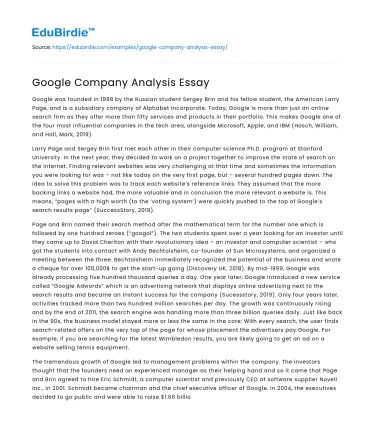Google was founded in 1998 by the Russian student Sergey Brin and his fellow student, the American Larry Page, and is a subsidiary company of Alphabet Incorporate. Today, Google is more than just an online search firm as they offer more than fifty services and products in their portfolio. This makes Google one of the four most influential companies in the tech area, alongside Microsoft, Apple, and IBM (Hosch, William, and Hall, Mark, 2019).
Larry Page and Sergey Brin first met each other in their computer science Ph.D. program at Stanford University. In the next year, they decided to work on a project together to improve the state of search on the internet. Finding relevant websites was very challenging at that time and sometimes the information you were looking for was – not like today on the very first page, but – several hundred pages down. The idea to solve this problem was to track each website’s reference links. They assumed that the more backing links a website had, the more valuable and in conclusion the more relevant a website is. This means, “pages with a high worth (to the ‘voting system’) were quickly pushed to the top of Google’s search results page” (SuccessStory, 2019).
Save your time!
We can take care of your essay
- Proper editing and formatting
- Free revision, title page, and bibliography
- Flexible prices and money-back guarantee
Page and Brin named their search method after the mathematical term for the number one which is followed by one hundred zeroes (“googol”). The two students spent over a year looking for an investor until they came up to David Cheriton with their revolutionary idea – an investor and computer scientist – who got the students into contact with Andy Bechtolsheim, co-founder of Sun Microsystems, and organized a meeting between the three. Bechtolsheim immediately recognized the potential of the business and wrote a cheque for over 100,000$ to get the start-up going (Discovery UK, 2018). By mid-1999, Google was already processing five hundred thousand queries a day. One year later, Google introduced a new service called “Google Adwords” which is an advertising network that displays online advertising next to the search results and became an instant success for the company (Sucessstory, 2019). Only four years later, activities tracked more than two hundred million searches per day. The growth was continuously rising and by the end of 2011, the search engine was handling more than three billion queries daily. Just like back in the 90s, the business model stayed more or less the same in the core: With every search, the user finds search-related offers on the very top of the page for whose placement the advertisers pay Google. For example, if you are searching for the latest Wimbledon results, you are likely going to get an ad on a website selling tennis equipment.
The tremendous growth of Google led to management problems within the company. The investors thought that the founders need an experienced manager as their helping hand and so it came that Page and Brin agreed to hire Eric Schmidt, a computer scientist and previously CEO at software supplier Novell Inc., in 2001. Schmidt became chairman and the chief executive officer of Google. In 2004, the executives decided to go public and were able to raise $1.66 billion for the company. That made Brin and Page billionaires overnight. In fact, of Google’s early stockholders, seven became billionaires and nine hundred of them became millionaires after the company’s initial public offering. In August 2015, Google had to reorganize itself as it became a subsidiary of Alphabet Inc. (Hosch, William and Hall, 2019). Larry Page overtook the CEO role of Alphabet, Sergey Brin was announced as president of Alphabet and so it came that Google got a new CEO in 2015: Sundar Pichai (Hanseranking, 2016). Since its foundation, Google has expanded its business in different areas: The company stepped into the mobile operating system, launched mapping services and its own hardware, a social network, and cloud computing applications (Tran, Sang Kim, 2017). Five years after its foundation, Google managed to reach a billion-dollar revenue in the year 2003 and became one of the most influential online service providers ever and reached an all-time high regarding their revenue in 2018 with $136 billion (Statista, 2018).
Without a doubt, these are great numbers for the company. Now the question arises, is it really just the business model and the technological know-how that makes Google so successful or are there more factors that play a key role in the success story?






 Stuck on your essay?
Stuck on your essay?

